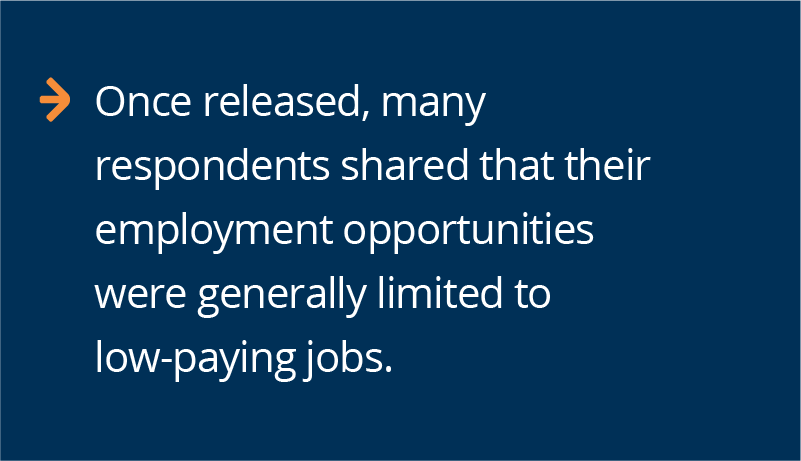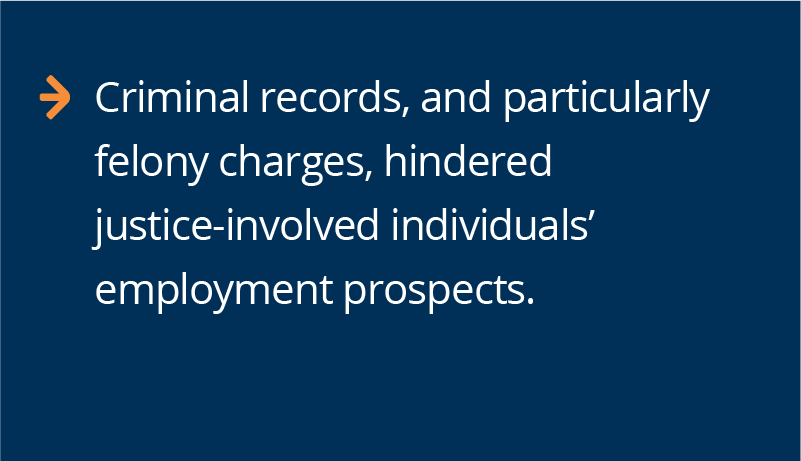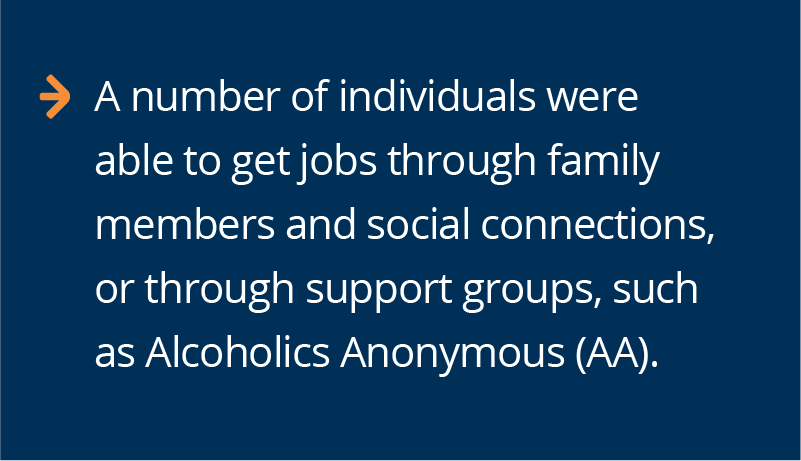Employment Challenges
Once justice-involved individuals re-enter society, there are numerous barriers to gain employment that often force them to make difficult decisions.
-
Category:

Key Findings
The Financial Health Network presents a look into 36 justice-involved individuals and their families, focusing on how their financial health affects their ability to navigate the U.S. criminal justice system and re-enter society. Our findings on the employment challenges of justice-involved individuals include:




The Consequences of Conviction
When individuals did secure employment, they were often at low-paying jobs with poor benefits, which were usually the only ones available to applicants with a criminal record. Their criminal records followed them wherever they applied for work.
- “There are places that don’t do the background checks, and they’re not great places because they don’t offer health insurance. There’s no guaranteed direct deposit with your check. They give you checks that bounce, or they want to pay you under the table.”
- “I don’t know how many applications [I sent out]. And I even had some pretty good interviews, but they all always asked [about my record].”
“I went through all the certification and paid for the classes for teaching jobs… and I was turned down because of my record.”
Hiding Their Records to Get Hired
Some individuals could not go back to their prior line of work, and others found that certain professions were closed off to them entirely. Many made the difficult decision to not disclose their records in order to obtain employment.
- One woman who found work cleaning people’s homes shared that, when she really needed the money, she would lie about her record to get a job. She shared: “I tell ’em, yeah. Sometimes, I tell ’em no. It just depends on if I was in real bad need of money.”
- “…I was basically told by the [state’s Public] Works [Department] here in [state] to lie on my applications and don’t tell them that I’m a felon. Well, as soon as I did that, of course, I was able to find employment.”
Finding Jobs Through Social Networks
For those with a criminal record, only being able to qualify for a limited amount of low-paying jobs often hinders individuals from securing stable financial footing once they re-enter society. Most of the individuals who found employment quickly after release found their jobs through connections.
- One man shared that his brother was able to connect him to a good job at the magazine company where he worked. Over the course of 8 years, he progressed there. He explained: “They allowed me the opportunity to do the work to prove that I was worth progressing, that I wasn’t gonna be somebody who’s just satisfied being at the bottom.” The brief on Support from Social Networks further explores this source of employment opportunities.

Ashley's Story
“I had an experience a couple years ago where I actually got hired for a job, worked two weeks, and then they found out I had a background and they fired me. It follows you the rest of your life.”
After getting released, Ashley went to live with her parents. Ashley initially found a full-time job immediately upon release through one of her father’s friends. Later, Ashley moved out of her parents’ home and into her own apartment where she had to balance paying rent with the court costs she owed, which became less manageable. She ended up missing her court payments and was sent back to jail. After serving the additional time, it was harder for Ashley to find a job.
Throughout the process, Ashley managed complex financial decisions:
- It took Ashley about three months to once again land employment, which she attributes to her criminal record.
- Ashley had to balance court costs – such as legal fees, restitution, and probation fees – on top of her rent.
- Ashley ended up missing her court payments, which sent her back to jail.
Employment challenges have remained an ongoing issue for Ashley since her second release.
More Stories of Justice-Involved Individuals
Managing the Initial Financial Shock
Justice-involved individuals and their families face a number of expenses that can create financial strains immediately after arrest, including posting bail and hiring legal representation.
Impact of Incarceration on Families
After a family member or loved one is arrested, their households are forced to juggle financial responsibilities, including staggering bills and missing payments.
Managing Financial Obligations
Once justice-involved individuals are released from jail or court, they are still not released from their financial obligations to the criminal justice system.
Support from Social Networks
Family and friends are a major lifeline for justice-involved individuals, providing support and advice from pre-trial to post-release.
Financial Health and Criminal Justice: The Stories of Justice-Involved Individuals and Their Families
This is one of five areas explored in our report “Financial Health and Criminal Justice.”





